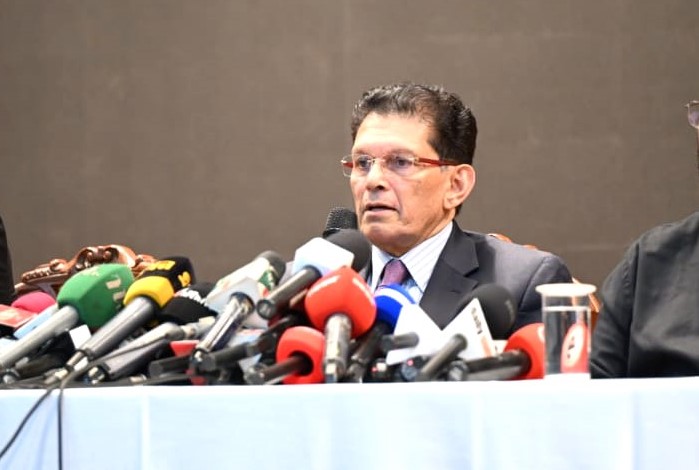Bangladesh has not discussed anything on establishing a corridor with anyone, but is reviewing a United Nations proposal to proposal to allow aid delivery into Myanmar’s Arakan (Rakhine) region via Bangladeshi territory.
“We are not providing any corridor. What we are considering is this: since it is currently impossible to supply aid to Rakhine through any other route, the UN has asked us to assist just across the border so they can take the aid through.” Khalilur Rahman, National Security Adviser to the interim administration, told a news conference in Dhaka on Wednesday.
His remarks came amid proposal for a humanitarian corridor dominated public discourse since Foreign Affair Adviser Touhid Hossain on April 27 told local media that the government in principle decided to allow corridor for Myanmar civilians under the UN supervision, subject to conditions.
Rahman, who also serves as High Representative on Rohingya issues for Chief Adviser Muhammad Yunus, said the UN’s operations in Myanmar can no longer continue in Rakhine due to the war situation and humanitarian aid cannot be transported to Rakhine.
In March, he said, the UN Secretary-General visited Bangladesh and inquired whether Dhaka could assist with the delivery of aid to Rakhine.
“We are considering the matter, but there are several prerequisites,” he said.
He informed that the UN has conveyed to the Arakan Army, an insurgent group fighting against junta in Myanmar and took control of most of Arakan, that there must be no obstruction in receiving or distributing aid.
No one should be excluded, and the aid must not be used for warfare, Rahamn said in reference to the UN proposal.
“Our concern is that in the new political, administrative, and security structures emerging in Arakan, we do not see the participation of the Rohingya people. We have directly told the Arakan Army that we will not tolerate any form of ethnic cleansing. If they intend to govern solely with the Rakhine population, they will become a racist state,” he said.
Bangladesh believes the only solution to this problem is the repatriation of the Rohingya, he said.
“All options to achieve this remain on our table. We will make every diplomatic and other efforts to solve this issue. Our objective is a peaceful resolution,” added the high representative.
Rahman firmly denied the corridor rumors saying: “Let me make it absolutely clear — we have not discussed any corridor with anyone, nor will we.”
“We are not providing any corridor. What we are considering is this: Since it is currently impossible to supply aid to Rakhine through any other route, the UN has asked us to assist just across the border so they can take the aid through.”
The UN, through its partners, will use existing internal channels within Rakhine to deliver humanitarian assistance to the people there, he added.
Given the current situation in Arakan, there is no need for a corridor, Rahaman said adding that there was no necessity for facilitating movement of people, the only need is to deliver aid.
“If we can do that, the situation there may stabilize, and then we can start discussions about Rohingya repatriation. As long as Arakan remains unstable, we cannot talk about repatriation. And without that, we cannot even talk about a repatriation strategy,” he added.
When asked about the post-delivery management inside Rakhine, Rahman said, the UN will have full control once the aid crosses the border. Security and everything else on that side will be their responsibility, he added.
“Our role ends at the border. We’ll monitor whether any drugs or other illicit items are being transported. If both parties agree, and the conflict subsides, only then will we proceed.”
Regarding which route aid may be delivered through, he said, “If all parties agree, we will sit together and decide. This is not only the government’s decision — all stakeholders must be involved. We have not yet reached that stage.”
When asked whether there was any difference of opinion with the military over the corridor issue, Rahman responded, “There is no disagreement with the military.”
“I’ve had detailed discussions with the Army Chief. We are on the same page. There is no divergence.”
There is no chance of any lack of coordination with the Foreign Ministry either, he said adding that he was working closely with the military.
He also clarified Foreign Adviser Touhid Hossain’s earlier remarks: “He may have used the term ‘corridor,’ but he later corrected himself, calling it a ‘pathway.’ It was a slip of the tongue and hasn’t been repeated.”
When asked whether this decision was taken under pressure from the United States, he replied, “Why only America? We’re not under pressure from anyone. No one is pressuring us. We’re speaking with the US, China, and everyone else. So, if pressure doesn’t exist, how am I supposed to feel it?”


